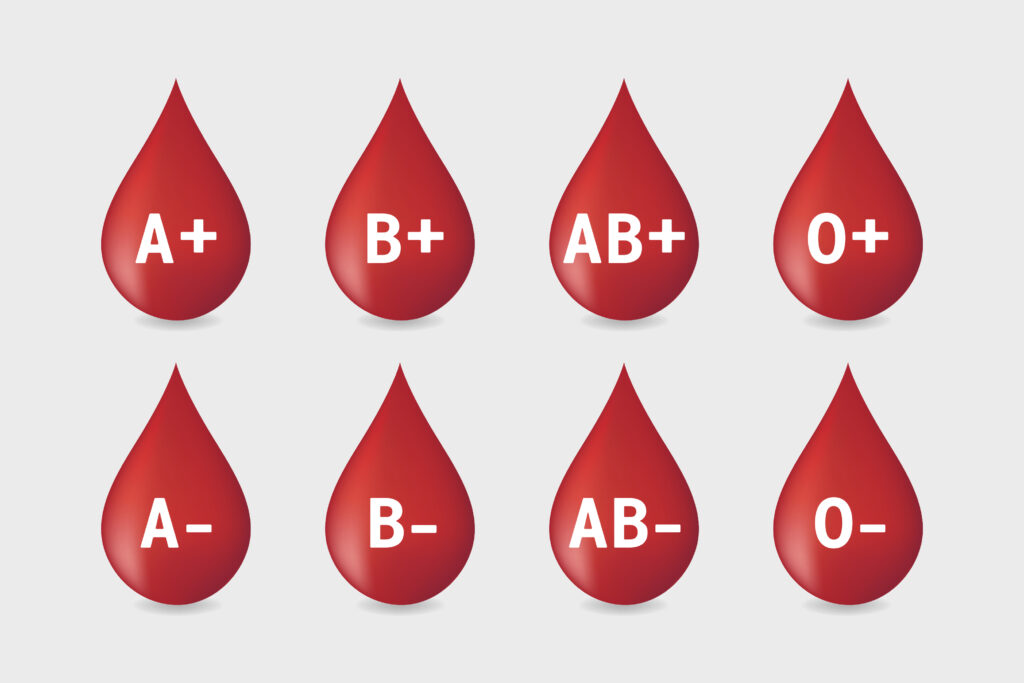Between 26-28 weeks of pregnancy, doctors give expectant Moms with an Rh-negative blood type a shot called RhoGAM to prevent complications from a potential “Rh incompatibility.”
What in the Heck is Rh-Negative Blood and What’s an Rh Incompatibility?
To understand what Rh-negative blood is and how an Rh incompatibility can develop, let’s first do a quick review of the different blood types.
As you may (or may not) know, there are 4 primary blood type groups: A, B, AB, and O.
In addition to having one of these blood type groups, each of us is either “Rh-positive” or “Rh-negative.”
Rh, Which Stands For “Rhesus” Factor, is a Protein Found on the Surface of Red Blood Cells.
- If your red blood cells have the Rh protein, you’re Rh positive and will have a plus sign after your blood-type group (A+, B+, AB+, or O+).
- If the Rh protein is absent on your RBCs, then you’re Rh negative and will have a minus sign after your blood-type group (A-, B-, AB-, or O-).
Here Are The 8 Different Possible Blood Type Combinations:

PediaTrivia:

Most people in the U.S. (85%) have an Rh-positive blood type. Only 15% of Americans have an Rh-negative blood type.1
What Does All of This Have to Do With Pregnancy?
Doctors check every pregnant woman’s blood type (via a blood test) at the first prenatal visit to look for a potential mismatch (an “Rh incompatibility”) between Mom-to-be’s blood type and her developing baby’s blood type. This mismatch only occurs if Mom-to-be has “Rh-negative” blood and the baby has “Rh-positive” blood.
How Will I Know if I’m at Risk for a Mismatch (aka an Rh Incompatibility)?
In a Nutshell: Your OB/GYN will tell you.
- If your doctor tells you that you’re Rh-positive, then you’re NOT at risk for an Rh incompatibility.
- If your doctor tells you that you’re Rh-negative, then your risk of an Rh incompatibility depends on Dad-to-be’s blood type.
Why? Because blood types are inherited.- For example, if both you and Dad-to-be have Rh-positive blood types, then your baby will have an Rh-positive blood type too (and won’t be at risk for an Rh-incompatibility). By the same token, if both you and Dad-to-be have Rh-negative blood types, then your baby will have an Rh-negative blood type as well (and won’t be at risk for an Rh-incompatibility).
- However, if you’re Rh-negative and Dad-to-be is Rh-positive, then your baby has a 50% chance of having an Rh-positive blood type (i.e. there’s a 50% chance of an Rh-incompatibility).
Insider Info: To keep things simple, doctors usually just check Mom-to-be’s blood type and don’t bother checking Dad-to-be’s blood type. If Mom-to-be has Rh-negative blood, then the RhoGAM shot is given between 26-28 weeks just in case the baby ends up having Rh-positive blood.
Note: Your baby’s blood type won’t be known until after they’re born and they can have their blood tested.
How Can an Rh Incompatibility Affect the Fetus?
An Rh incompatibility can cause jaundice (a yellowing of the skin & the whites of the eyes) and anemia (a low number of healthy red blood cells) in the developing baby. Red blood cells are important because they carry oxygen to different parts of the body.
How Do Rh Incompatibilities Lead to Anemia?
If Mom-to-be’s Rh-negative blood mixes with the fetus’s Rh-positive blood, the Rh-negative blood will “see” the Rh-positive blood as foreign and make antibodies against it. These antibodies will then attack and destroy the developing baby’s red blood cells, making the baby anemic. Jeez, Aggressive Much?!

Insider Info:
First-born babies are less likely than second-born babies to become anemic if there’s an Rh incompatibility.
Why? Because Mom’s blood and her fetus’s blood don’t usually mix until the delivery. In this case, the baby is already on their way out before the antibodies have time to destroy their red blood cells. However, the antibodies can linger in Mom’s bloodstream and attack a second Rh-positive baby’s blood (if Mom has another child).
An Exception to the Rule: If you have an Rh-negative blood type and you experience vaginal bleeding before you deliver your baby (for example, after an amniocentesis), then your blood could mix with your baby’s (potentially Rh-positive) blood and make antibodies against it. In this case, your current fetus could be affected by the Rh incompatibility (as could future babies).
The Good News: ALL Rh incompatibility problems (in both current and future pregnancies) can be prevented with a shot called RhoGAM.
Great…Where Do I Sign Up?
As mentioned above, if you’re “Rh-negative” (A-, B-, AB-, or O-) and Dad-to-be’s blood type is unknown (or is known to be “Rh-positive”), then your doctor will recommend that you get the RhoGAM shot between 26-28 weeks of pregnancy. This shot protects your developing baby from anemia in the off-chance they’re Rh-positive and you experience any bleeding before delivery.
Caveat: If you have bleeding before 26-28 weeks, your doctor may give you the RhoGAM shot earlier (i.e. within 72 hours of the start of the bleeding) to prevent any Rh-incompatibility shenanigans.
Sneak Peek:
- After you deliver your baby, the doctor will test your baby’s blood to determine if they were indeed Rh-positive.
- If your baby is Rh-negative, then there was no Rh incompatibility in the first place and nothing more needs to be done.
- If your baby is Rh-positive, the doctor will monitor them for signs of anemia and jaundice. In addition, you’ll need a second RhoGAM shot (within 72 hours after giving birth, before you leave the hospital). The purpose of this second shot isn’t to protect your new baby, but to prevent your immune system from building up antibodies that could hang around and attack any future Rh-positive babies that you have. Even if you get this second RhoGAM shot, you’ll still need to get a RhoGAM shot with every pregnancy (as long as Dad-to-be’s blood type is unknown or Rh-positive).
Whew…That Was a LOT of Talk About Blood Types
and Rh Incompatibility!
And…Breathe…

The Bottom Line
Rh incompatibility can be a tricky concept to understand. We did a deep dive into it for posterity’s sake, but all you really need to remember is that your doctor will check your blood type at your first prenatal visit. If you’re “Rh-negative” (A-, B-, AB-, or O-) and Dad-to-be’s blood type isn’t known (or is Rh-positive) then you’ll want to get a RhoGAM shot between 26-28 weeks. If your baby turns out to be Rh-positive, they’ll be monitored for anemia and jaundice and you’ll get a second RhoGAM shot within 72 hours after giving birth.








